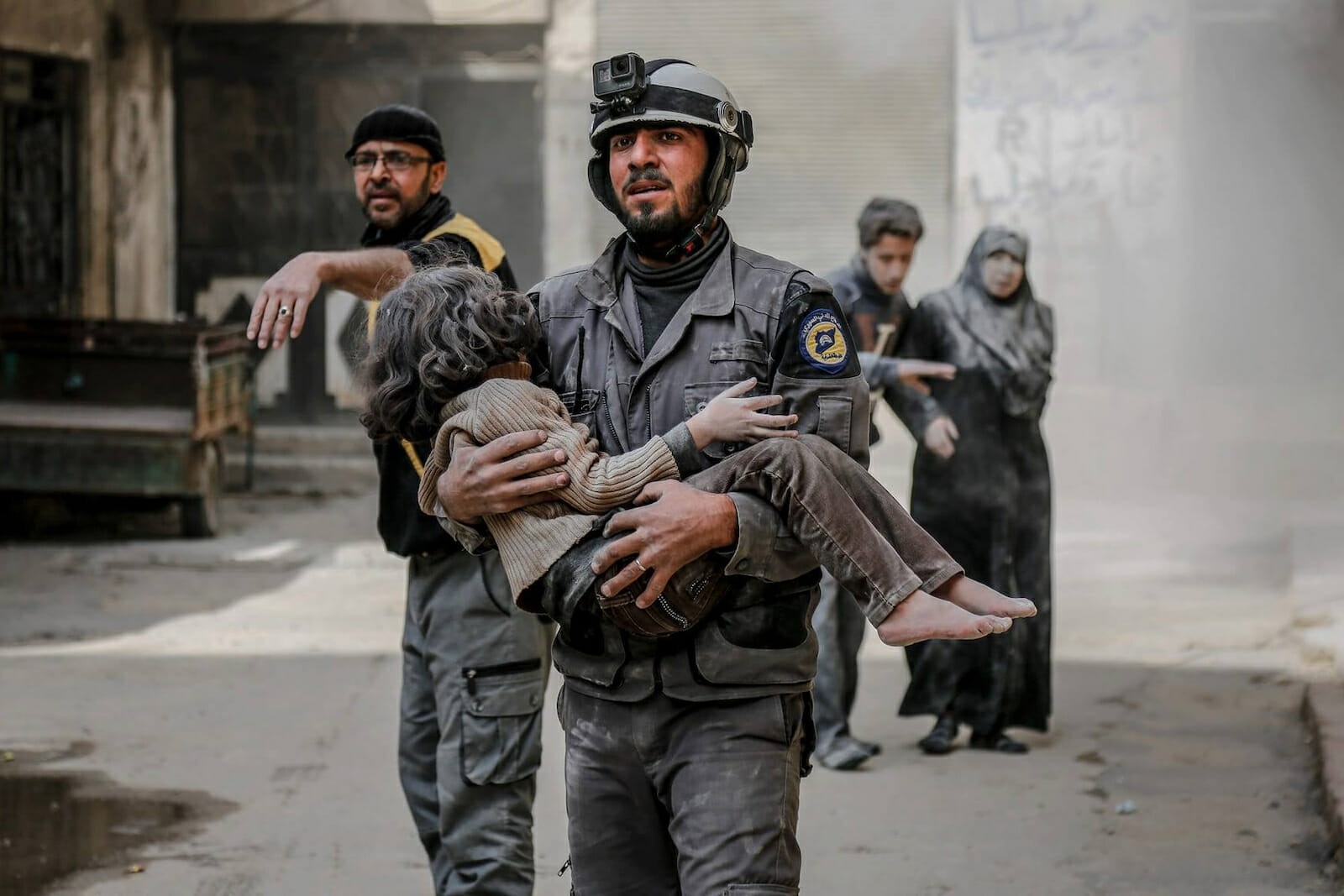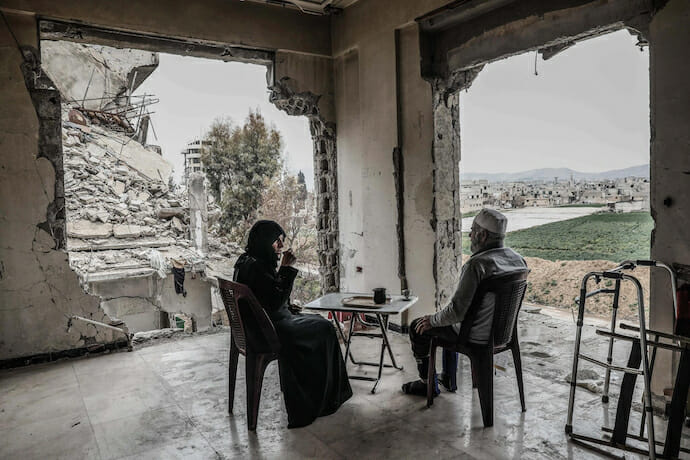
The Syrian War’s Media Sludge Persists
Consistently reliable sources of news covering the war in Syria have been hard to come by. The conflict itself – with its numerous actors and severe limitations on ground-level reporting – has been a breeding ground for rival narratives and misinformation.
The Global Forum for Media Development has rightly recognised this as an ‘intense media war being waged by different sides in the conflict’ that has been occurring ‘parallel to the military conflict.’
While we as readers have certainly benefitted from the flattening effect of communication technologies and the growth of low-cost platforms for news and opinion, we are faced with an increasingly confused media landscape. Information flows documenting current affairs at a startling speed. People on the ground become makeshift reporters through social media before international media outlets can even get close.
The importance of perception in causing and abating conflict is not a new concept, but it is all too apparent in the media sludge that surrounds the war in Syria. Even the most recognised ‘official’ news sources are prone to sensationalizing and selectively ignoring information. But this is really the tip of the iceberg.
What lies beneath is a sludge of conflicting media narratives, many of which are directly linked to national governments involved in the conflict.
The international media’s competing narratives
A key battleground for media outlets has been the competing narratives documenting the White Helmets, simultaneously shown as ‘Syria’s Noble Rescuers,’ opportunist bandits, or a more sinister group of radical Islamists.
The Turkish state media, for one, championed the role of Syrian white helmets, with The Guardian favourably covering the attempts of the White Helmets (that ‘saved thousands’) to settle in Canada. Further, there is the 2017 Oscar-winning Netflix documentary, The White Helmets, depicting heroism by the members on the ground in Syria. This narrative represents the prevailing view of the White Helmets amongst Western media outlets.
Conversely, the Syrian government financed an English language movie that tells the story of a naïve journalist who enters Syria illegally looking for a big scoop covering Assad’s war crimes and is forced into faking footage in the hope of winning a Pulitzer Prize. This narrative fits well in line with actual accusations leveled by Russia towards foreign journalists and their coverage of the White Helmets. It is safe to assume that Assad’s interests in this film go beyond an appreciation for the arts.
These narratives are then backed by independent media outlets and ‘alternative’ reporters of the war. For example, Vanessa Beeley (labeled by journalist Brian Whitaker as the ‘goddess of propaganda’) recently described the White Helmets as being guilty of ‘child exploitation, abuse, human trafficking, and organ trafficking.’ Other independent writers describe them as “appendages to the jihadists.”
The portrayal of the White Helmets has been used as a political tool by every side in different ways. This portrayal predominantly exists in a simplistic good-bad binary in the international media that continues to perfectly mirror and reproduce each country’s position regarding the White Helmets. As heroes or villains.
This is certainly not to imply that the press in countries like the UK and Turkey are somehow the same. But, instead, those narratives are present in free-press societies, just as in societies with high state-involvement and restrictions.

We in the West should take no moral superiority in the way the mainstream media reports. BBC journalist, Lyse Doucet, for one offers criticisms of Western mainstream reporting. We have been offered consistent reporting of the desperate human casualty of the war, including photos of bloodied crying children, with President Trump indicating that such sights ‘had a big impact’ on him in the lead up to the April 2017 US-French-British missile strikes on Damascus and Homs. However, comparatively, far less attention is given by the media outlets to the murky ties between Western states and radical Islamist rebel groups.
Similarly, in December 2018, RT reported the details of a presentation given by Maxim Grigoriev, director of the Foundation for the Study of Democracy (an organisation based in Russia and a member of the UN Global Counter-Terrorism Research Network), to the UN Security Council asserting numerous grave misdeeds committed by the White Helmets.
Regardless of whether the reader is convinced of the evidence presented, this presentation did happen and is available on YouTube. There is a glaring absence in Western reporting of this damning indictment.
The negligence of international news outlets is not the only factor at play, however. There is the projection of equally damaging ‘alternative news’ sources.
Beyond the mainstream
The alternative outlets are able to assume an intellectual high-ground through claiming that they are, for example, the ‘News for the Waking Generation™,’ posing themselves as the logical opposite to the blind followers of the maligned ‘MSM’ (Mainstream Media), who ‘operate as a propaganda system for the elite interests that dominate modern society.’ The problem is that they are just as prone to following false leads, sensationalising developments in the conflict, and making unsubstantiated claims.
Take 21st Century Wire, a prominent supporter of Douma ‘false-flag’ perspectives, with the aforementioned Vanessa Beeley as Associate Editor. An organisation described by the Fake News Codex as ‘genuinely unhinged.’ Its homepage online features a prominent ‘Hollywood’ section, criticising the liberal ‘psy-ops,’ pride of place next to its section devoted to discrediting the White Helmets.
21st Century Wire has been consistently condemned by many fact-checking outlets and plays host to conspiracy theorists of all stripes, but its contributors retain a prominent international outreach. One writer covering Syria, Eva Bartlett – whose reporting has been labeled as ‘fiction’ by Channel 4 (UK) fact-checkers – has received awards for her international journalism in Syria and is a frequent collaborator with Russia Today.
It is a strange state of journalistic affairs where a writer is simultaneously discredited by fact-checkers in one country as producing fictitious material but still receives journalistic awards in another and provides analysis and reporting on one of the largest international news networks in the world.
Even within the proposed counter-narratives offered by the non-mainstream press, there is an absence of agreement on most events, notably with the chemical attacks in Syria. On one hand, there was US alt-right leader Richard B. Spencer, who asserted that the Douma chemical attacks appeared to have been orchestrated as a false flag by Trump to dispel domestic political pressures. Meanwhile, the Russian representative to the Organisation for the Prohibition of Chemical Weapons labeled Douma as a British-orchestrated false flag as part of a wider Western pretext for intervention.
The media landscape covering Syria is persistently a messy battlefield, even amongst ‘official’ news sources, where the truth of the events can become a distant – almost irrelevant – factor. The resulting sludge only emboldens foreign policy leaders and stakeholders to pursue their own agendas in the absence of any semblance of media consensus to hold them to task.
Finally…
Designs to ‘improve fact-checking’ to establish some sort of beacon of truth appear naive. Empowering fact-checking initiatives is important, but it is not enough.
Articles and think pieces emerge with startling speed after major events, each asserting their opinion and even claiming objective truth. This is beyond the scope of fact-checking, whose role, at most, works to discredit outlets producing false news but does not stem the tide. That’s not even taking into account the fact-checkers themselves who are being accused of bias.
If policymakers seek to better their understanding of geopolitics, the war in Syria, and the goals and pressures of the actors at large, paying closer attention to the topography of the media landscape outside of what is thrust in front of them would be a very good place to start.
For the individual reader, completely deciphering the complicated media narratives of the Syrian war is a daunting prospect and, to many extents, impossible. Nevertheless, engaging with articles outside of one’s media bubble and applying some cynicism to what appears to be ‘objective news’ from even the most reputable news outlets will reap dividends. Ultimately, always ask what the narrative could be in what you are reading.
